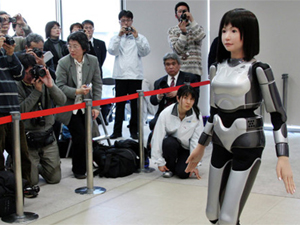



Date:15/02/16
 With the advances made in Artificial Intelligence (AI), human labour may soon become obsolete, experts have warned.
With the advances made in Artificial Intelligence (AI), human labour may soon become obsolete, experts have warned.
Rice University computer scientist Moshe Vardi expects that within 30 years, machines will be capable of doing almost any job that a human can. In anticipation, he is asking his colleagues to consider the societal implications. Can the global economy adapt to greater than 50 percent unemployment? Will those out of work be content to live a life of leisure?
Vardi said that they are approaching a time when machines will be able to outperform humans at almost any task, adding that society needs to confront this question before it is upon us: If machines are capable of doing almost any work humans can do, what will humans do?
"The question I want to put forward is, 'Does the technology we are developing ultimately benefit mankind?'" Vardi said.
He will present a body of evidence that suggests the pace of advancement in the field of artificial intelligence (AI) is increasing, even as existing robotic and AI technologies are eliminating a growing number of middle-class jobs and thereby driving up income inequality.
Vardi said some people believe that future advances in automation will ultimately benefit humans, just as automation has benefited society since the dawn of the industrial age.
"A typical answer is that if machines will do all our work, we will be free to pursue leisure activities," Vardi said. But even if the world economic system can be restructured to enable billions of people to live lives of leisure, Vardi questions whether it would benefit humanity.
Robots could leave half of world unemployed
 With the advances made in Artificial Intelligence (AI), human labour may soon become obsolete, experts have warned.
With the advances made in Artificial Intelligence (AI), human labour may soon become obsolete, experts have warned.Rice University computer scientist Moshe Vardi expects that within 30 years, machines will be capable of doing almost any job that a human can. In anticipation, he is asking his colleagues to consider the societal implications. Can the global economy adapt to greater than 50 percent unemployment? Will those out of work be content to live a life of leisure?
Vardi said that they are approaching a time when machines will be able to outperform humans at almost any task, adding that society needs to confront this question before it is upon us: If machines are capable of doing almost any work humans can do, what will humans do?
"The question I want to put forward is, 'Does the technology we are developing ultimately benefit mankind?'" Vardi said.
He will present a body of evidence that suggests the pace of advancement in the field of artificial intelligence (AI) is increasing, even as existing robotic and AI technologies are eliminating a growing number of middle-class jobs and thereby driving up income inequality.
Vardi said some people believe that future advances in automation will ultimately benefit humans, just as automation has benefited society since the dawn of the industrial age.
"A typical answer is that if machines will do all our work, we will be free to pursue leisure activities," Vardi said. But even if the world economic system can be restructured to enable billions of people to live lives of leisure, Vardi questions whether it would benefit humanity.
Views: 563
©ictnews.az. All rights reserved.Similar news
- Mobile operators of national market to reduce roaming tariffs
- Iran vows to unplug Internet
- China Targeting Telecoms in Corruption Probe
- Bangladesh to use electronic voting system for next elections
- Philippine IT sector to launch five-year digital strategy plan
- Russian Premier Vladimir Putin meets ITU Secretary-General Hamadoun Touré
- US lawmakers propose to regulate use of geolocation data
- Unlimited mobile data plans dying as telcos gear up for cloud future
- Europe at risk of falling behind US and Asia on 4G use
- Netherlands first to regulate on net neutrality
- Korean Co Takes Aim At Display Patents
- Regulators, Banks Look for IT Hires After Breakdowns
- Electron transactions spreading
- Schools in remote rural areas will connect to the single database via network without SIM
- Obama to Personally Tweet From Twitter Account





















